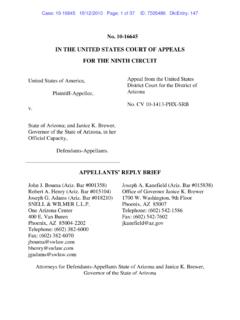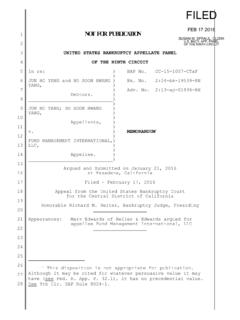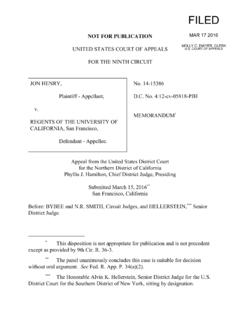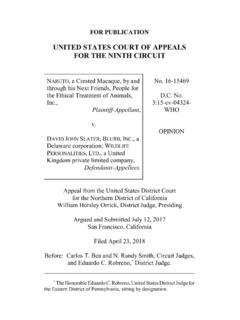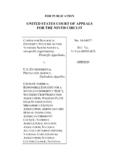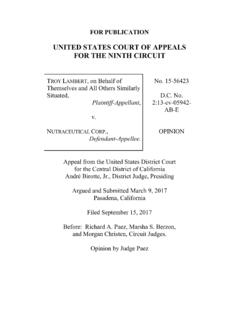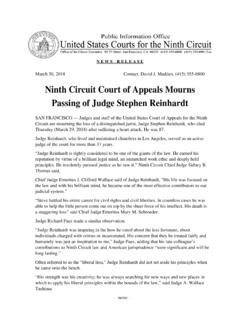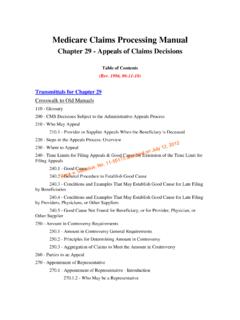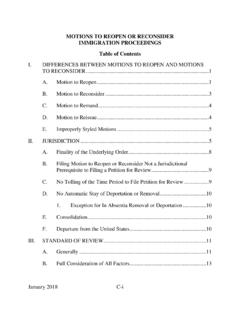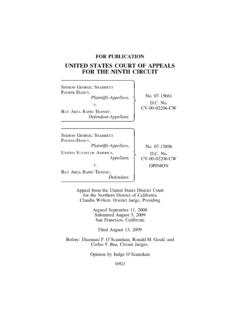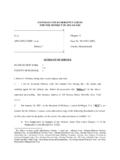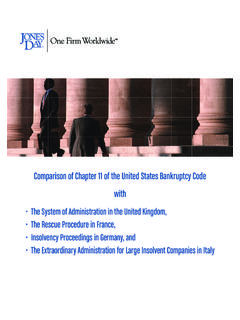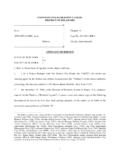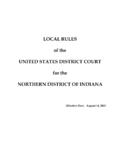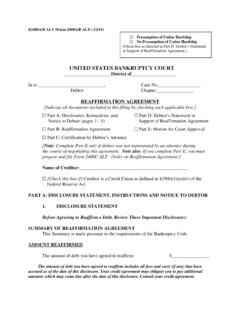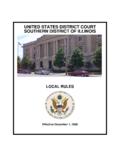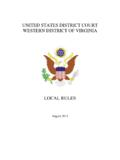Transcription of UNITED STATES COURT OF APPEALS FOR THE …
1 FOR PUBLICATION UNITED STATES COURT OF APPEALS FOR THE ninth circuit IN THE MATTER OF TRANSWEST RESORT PROPERTIES, INC., Debtor, JPMCC 2007-C1 GRASSLAWN LODGING, LLC, Appellant, v. TRANSWEST RESORT PROPERTIES INCORPORATED; SWVP LA PALOMA LLC; SWVP HILTON HEAD LLC, Appellees. No. 16-16221 Nos. 4:12-cv-00024-RCC 4:12-cv-00121-RCC OPINION appeal from the UNITED STATES District COURT for the District of Arizona Raner C. Collins, Chief District Judge, Presiding Argued and Submitted October 25, 2017 San Francisco, California Filed January 25, 2018 2 IN RE TRANSWEST RESORT PROPERTIES Before: J. CLIFFORD WALLACE, MILAN D. SMITH, JR., and MICHELLE T. FRIEDLAND, circuit Judges. Opinion by Judge Milan D. Smith, Jr.; Concurrence by Judge Friedland SUMMARY* Bankruptcy The panel affirmed the district COURT s affirmance of the bankruptcy COURT s order approving a Chapter 11 cramdown reorganization plan of five related debtors.
2 The debtors had previously acquired two resorts. A lender, whose claim was undersecured, elected to have its entire claim treated as secured pursuant to 11 1111(b)(2). The plan restructured the lender s loan to a term of 21 years and included a due-on-sale clause requiring the debtors to pay the lender the outstanding balance of the loan if the resorts were sold. The due-on-sale clause did not apply if the debtors were to sell the resorts between years five and fifteen. The panel held that an election under 1111(b)(2) does not require that a due-on-sale clause be included in a reorganization plan. * This summary constitutes no part of the opinion of the COURT . It has been prepared by COURT staff for the convenience of the reader.
3 IN RE TRANSWEST RESORT PROPERTIES 3 The panel also held that 1129(a)(10), which requires that at least one impaired class accept a cramdown plan, applies on a per plan basis, rather than a per debtor basis. Concurring, Judge Friedland agreed that 1111(b)(2) does not require that a bankruptcy plan include complete due-on-sale protection for the creditor and that 1129(a)(10) applies on a per plan basis. She wrote separately to acknowledge the argument of the lender that it was unfairly deprived of the ability to object effectively to reorganization of two of the debtors, despite being their only creditor. Judge Friedland wrote that any unfairness resulted not from the interpretation of 1129 challenged by the lender, but instead from the fact that the reorganization treated the five debtor entities as if they had been substantively consolidated something the lender did not object to in the bankruptcy COURT .
4 COUNSEL David M. Neff (argued) and Eric E. Walker, Perkins Coie LLP, Chicago, Illinois; Dean C. Waldt, Ballard Spahr LLP, Phoenix, Arizona; for Appellant. Donald A. English (argued) and Christy I. Yee, English & Gloven APC, San Diego, California; Susan G. Boswell and Brad D. Terry, Quarles & Brady LLP, Tucson, Arizona; for Appellees. 4 IN RE TRANSWEST RESORT PROPERTIES OPINION M. SMITH, circuit Judge: JPMCC 2007-C1 Grasslawn Lodging, LLC (Lender) objected to the Chapter 11 plan of five related entities (collectively, Debtors) who previously acquired two hotels. Despite these objections, the bankruptcy COURT approved a cramdown reorganization plan. The Lender appealed to the district COURT , but the district COURT concluded that the Lender s appeal was equitably moot. In 2015, we reversed the district COURT s equitable mootness determination, and remanded to the district COURT for consideration of the Lender s appeal on the merits.
5 See In re Transwest Resort Props., Inc., 801 1161 (9th Cir. 2015) (Transwest I). On remand, the district COURT evaluated the merits of the Lender s appeal , and concluded that (1) an election under 11 1111(b)(2) does not require that a Chapter 11 plan contain a due-on-sale clause; and (2) 11 1129(a)(10) applies on a per plan, not a per debtor, basis. This appeal is limited to the construction of 11 1111(b)(2) and 11 1129(a)(10).1 Based on the plain language of both statutory sections, we affirm. FACTUAL AND PROCEDURAL BACKGROUND In 2007, the Debtors acquired the Westin Hilton Head Resort and Spa and the Westin La Paloma Resort and Country Club (collectively, the Resorts). The Debtors were composed of: Transwest Hilton Head Property, LLC, and Transwest Tucson Property, LLC (Operating Debtors); 1 Unless otherwise noted, subsequent statutory references are to Title 11 of the UNITED STATES Code.
6 IN RE TRANSWEST RESORT PROPERTIES 5 Transwest Hilton Head II, LLC, and Transwest Tucson II, LLC (Mezzanine Debtors); and Transwest Resort Properties, Inc. (Holding Company Debtor). The Holding Company Debtor was the sole owner of the Mezzanine Debtors. The Mezzanine Debtors were, in turn, the sole owners of the two Operating Debtors, who owned and operated the Resorts. The acquisitions were financed by (1) a $209 million mortgage loan to the Operating Debtors from the Lender, secured by the Resorts (the Operating Loan); and (2) a $ million loan from Ashford Hospitality Finance, LP (Mezzanine Lender), secured by the Mezzanine Debtors interests in the Operating Debtors (the Mezzanine Loan). In 2010, the Debtors filed for Chapter 11 bankruptcy. The five cases involved were jointly administered, but not substantively The Lender filed a claim in the bankruptcy proceeding for $298 million, based on the Operating Loan.
7 The Mezzanine Lender filed a $39 million claim based on the Mezzanine Loan. The Lender subsequently acquired this claim from the Mezzanine Lender. The Debtors filed a joint Chapter 11 reorganization plan (the Plan), whereby third-party investor Southwest Value Partners would acquire the Operating Debtors for $30 million, thereby extinguishing the Mezzanine Debtors ownership interest in the Operating Debtors. The Lender, whose claim was undersecured, elected to have its entire claim treated as secured pursuant to 11 1111(b)(2). The Plan restructured the Lender s loan to a term of 21 years, and required monthly interest payments, 2 The Lender never objected to or argued that the bankruptcy COURT was treating the case as if substantive consolidation had occurred.
8 6 IN RE TRANSWEST RESORT PROPERTIES and a balloon principal payment at the end of the term. The Plan included a due-on-sale clause requiring the Debtors to pay the Lender the outstanding balance of the restructured loan in the event the Resorts were sold. However, the due-on-sale clause did not apply if the Debtors were to sell the Resorts between Plan years five and fifteen. The Lender voted against the Plan. Several other impaired classes voted to approve the Plan. The Lender objected to two aspects of the First, the Lender objected to the ten-year exception in the due-on-sale clause. It contended that the exception in the due-on-sale clause would allow the Debtors to partially negate the benefit of the Lender s section 1111(b)(2) election. Second, the Lender asserted that section 1129(a)(10), which requires that at least one impaired class accept the Plan, applies on a per debtor, not a per plan, basis.
9 Because the Lender is the only class member for the Mezzanine Debtors and did not vote to approve the Plan, the Lender argued that the Plan did not satisfy section 1129(a)(10). Despite the Lender s objections, the bankruptcy COURT approved the Plan. Following an unsuccessful emergency motion for a stay pending appeal , the district COURT dismissed the Lender s appeal as equitably moot. In 2015, we reversed this dismissal and remanded to the district COURT with instructions to evaluate the Lender s objections on the merits. Transwest I, 801 at 1173. On remand, the district COURT ruled that an election under section 1111(b)(2) does not require that a due-on-sale clause be included in the Plan, and that section 1129(a)(10) applies on a per plan basis. The district COURT 3 The Lender raised other objections to the Plan, but the parties previously resolved those objections.
10 IN RE TRANSWEST RESORT PROPERTIES 7 thereby affirmed the bankruptcy COURT s confirmation of the Plan. The Lender timely appealed to our COURT . JURISDICTION AND STANDARD OF REVIEW We have jurisdiction over this appeal pursuant to 28 158(d)(1). Because the Lender APPEALS from the district COURT s conclusions of law and interpretations of the Bankruptcy Code, we review de novo. See Smith v. Arthur Andersen LLP, 421 989, 1006 (9th Cir. 2005); In re Barakat, 99 1520, 1523 (9th Cir. 1996). ANALYSIS I. 11 1111(b) The Lender first challenges the district COURT s conclusion that a due-on-sale clause need not be included in the Plan when an undersecured creditor elects to have its claim treated as secured pursuant to section 1111(b)(2). This section must be read in context. Pursuant to section 506(a), an undersecured creditor s claim is bifurcated into: (1) a secured claim equal to the value of the collateral and (2) an unsecured claim equal to the remainder of the obligation owing to the creditor as of the petition date.
